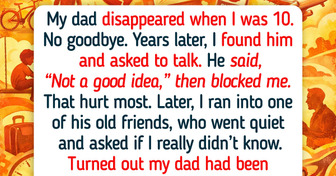DIL should pay for daycare or Nanny. Grandma enjoy your life, you raised your family.
I Gave My Grandson Food My DIL Forbade—She Cut Me Out Completely
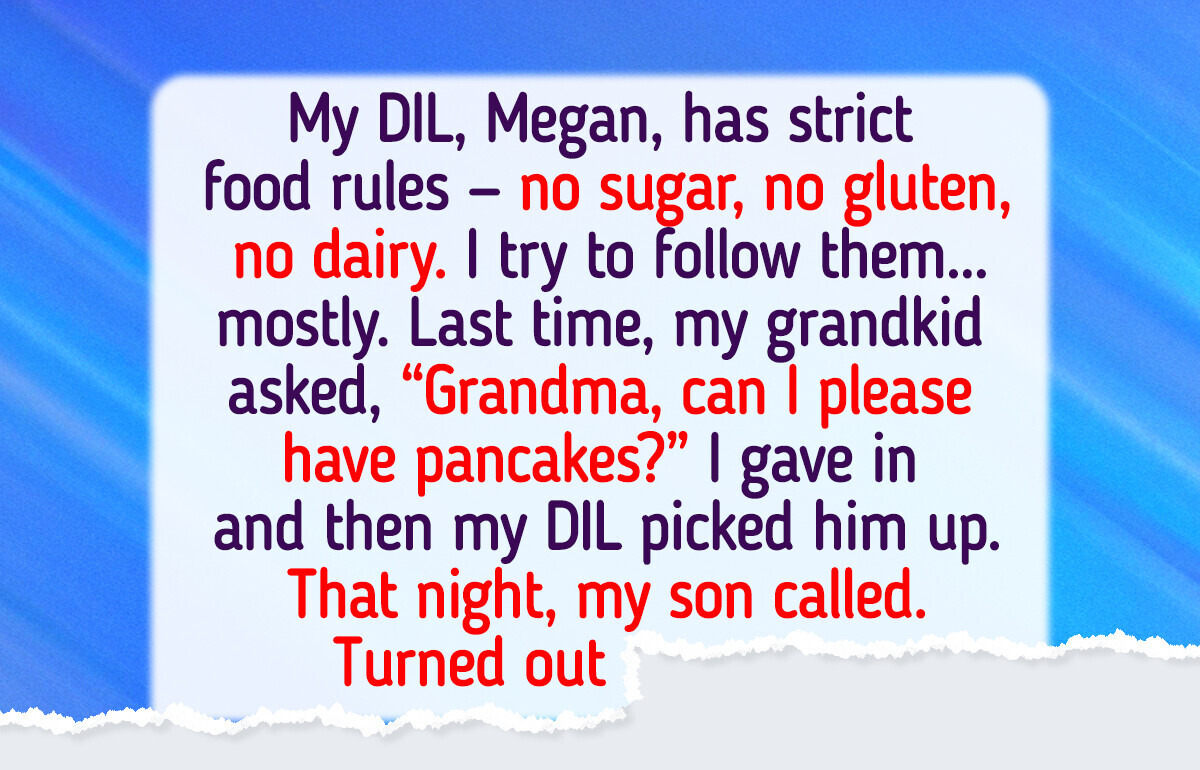
Parenting rules change with every generation — but love from a grandparent never does. Still, even the kindest intentions can go sideways when boundaries blur between “helping” and “overstepping.”
Here’s what one reader shared with us — a story that began with pancakes and ended in heartbreak.
The letter:
“Hi Bright Side!
When my grandson comes over, it’s the highlight of my week. My daughter-in-law, Megan, runs a tight ship — no sugar, no gluten, no dairy. But he wasn’t diagnosed with any allergic reaction. I usually follow her rules... usually.
Last visit, my grandson looked at me with those puppy eyes and said, ‘Grandma, can I please have your pancakes?’ I caved. Used dark chocolate chips, thought it’d be fine. He was so happy, I didn’t regret it.
A few days later, my son called and said my grandson had caught some kind of infection at kindergarten — little red spots on his arms, nothing serious, but they were keeping an eye on it. He just wanted to let me know in case I noticed anything.
I panicked. Before he could even finish, I blurted out, ‘It might’ve been me — I gave him pancakes with chocolate chips.’ There was silence on the line.
He sighed and said, ‘Mom... it’s fine. But you really should’ve told us.’
An hour later, Megan texted: ‘You broke our trust. Don’t come over for now.’
I just sat there staring at my phone, feeling like I’d lost something I didn’t even know could be taken away.
It’s been weeks. I dropped off a batch of plain pancakes on their porch.
No answer.
What should I do next?”
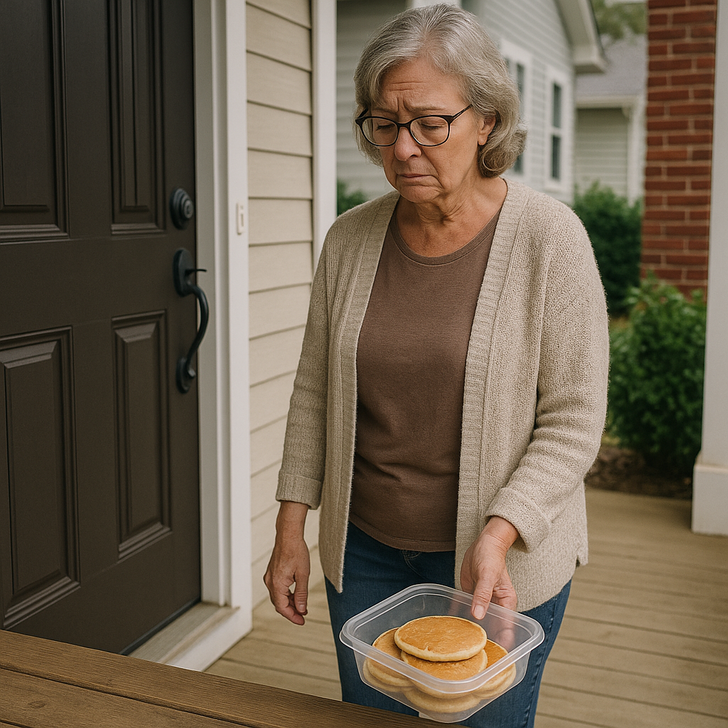
Thank you for writing to us and trusting us with your story. It’s never easy when love and guilt get tangled, especially between family. You’re not alone — so many grandparents find themselves in this same painful spot.
Why This Hurts So Much.
Psychologists say conflicts like this often have less to do with pancakes — and more to do with control, trust, and identity.
When parents feel anxious about their child’s health, even small mistakes can feel like betrayal. Parents under high stress often respond to perceived risks with overprotection, even when the danger is minor.
At the same time, grandparents tend to express love through nurturing and tradition — cooking, feeding, giving treats. So when those gestures are rejected, it can feel deeply personal.
How to Rebuild Trust.

💬 Start with accountability, not defense. A simple “I understand why you were scared” goes farther than explanations.
🕊️ Show consistency. Drop off safe snacks that follow her rules — it signals respect and reliability.
❤️ Don’t compete — connect. Ask, “How can I help in a way that makes you comfortable?” This turns the tension into teamwork.
🧘 Forgive yourself. Self-compassion helps reduce guilt and repair bonds faster than avoidance.
Some tips on how to deal with DIL.

🌸 Her Appearance: Less “Advice,” More Kindness
Do:
Tell her she looks radiant, strong, beautiful. Compliments mean the world — especially during pregnancy or postpartum, when sleep and self-esteem are both running low.
Don’t:
Comment on her weight, say “you look tired,” or ask when the next grandbaby’s coming. Some thoughts are better left unspoken.
🎂 Family Events and Birthdays: Celebrate, Don’t Take Over
Do:
Ask what she needs. Use the registry. Offer help — maybe it’s picking up decorations or bringing dessert.
Don’t:
Show up with giant, noisy toys, extra guests, or your own menu. It’s a family gathering, not a surprise concert.
💖 Holidays: Share the Spotlight
Do:
Be flexible. Let her spend time with her side of the family. You can always celebrate on another day.
Don’t:
Act like Mother’s Day is your personal holiday. She’s building traditions, too — let her shine in her own home.
🧘♀️ Disagreements and Opinions: Less Talking, More Listening
Do:
If you’re unsure what went wrong, ask — gently. Listen without interrupting, and offer a sincere apology if you hurt her feelings. It goes a long way.
Don’t:
Be passive-aggressive or expect your child to take sides. Love thrives on accountability, not alliances.
👶 Parenting: Support, Don’t Supervise
Do:
Respect her parenting style. Follow her rules when babysitting, and ask before giving treats or screen time.
Offer advice only if asked — sometimes she just needs support, not a solution.
Don’t:
Compare her to “how you did it.” Times change, research evolves, and your grandkids are growing up in a new world.
🏡 Space and Boundaries: Knock Before You Enter — Literally and Emotionally
Do:
Schedule visits, ask how long you should stay, and respect her comfort zone.
If your grandchild says “no” to hugs, smile and say, “That’s okay.” Respect builds trust faster than pressure.
Don’t:
Drop by unannounced or assume you’re entitled to be anywhere — even the delivery room.
💬 Accept Your Place — and Find Peace in It
Do:
Understand that after marriage, your child’s priority becomes their spouse. It doesn’t mean you’ve been replaced — just that love now flows in more directions.
Therapy helps if this shift feels heavy. Truly, “therapy is cool.”
Don’t:
Compete, compare, or cling to the past. You’re not losing your child — you’re gaining a family.
Love doesn’t disappear because of one mistake — it just needs time, honesty, and a little faith to find its way back.
12 Stories That Prove Kind People Aren’t Weak, They’re Quiet Superheroes
Comments
Related Reads
I’m Not Delaying My Retirement for My Sick Daughter — I’m Done Being Her Cash Cow

16 Heartfelt Times Children Proved Kindness Can Change Everything
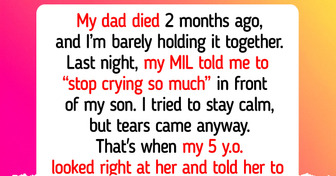
I Got Fired for Refusing to Let My Boss Humiliate Me in Front of Everyone
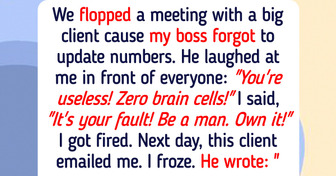
10 Moments That Prove Kindness Prevails Even in an Unfair World
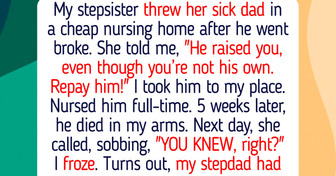
My Toxic Coworker Spread Lies About Me and Got Me Demoted—but I Got the Ultimate Victory
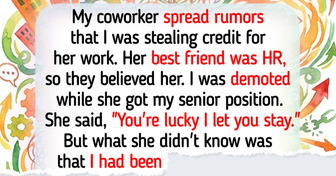
I Refused to Be Called the Office Villain by a Coworker Who Barely Works
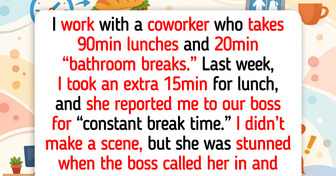
14 Friends Who Have a Black Belt in Creating Awkward Situations
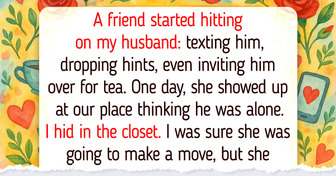
My Boyfriend’s Mom Kept Mocking My Career—My Response Silenced the Whole Table

12 Moments Where Empathy Showed the Power of a Kind Heart
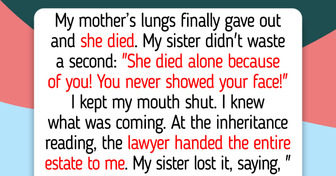
My Mom Refused to Be Called Grandma, and My 6-Year-Old’s Response Was Unforgettable
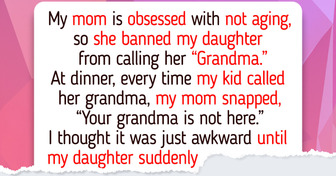
I Refuse to Let My Sister Hijack My Pregnancy Announcement

10 Moments That Show Kindness Doing the Heavy Lifting
